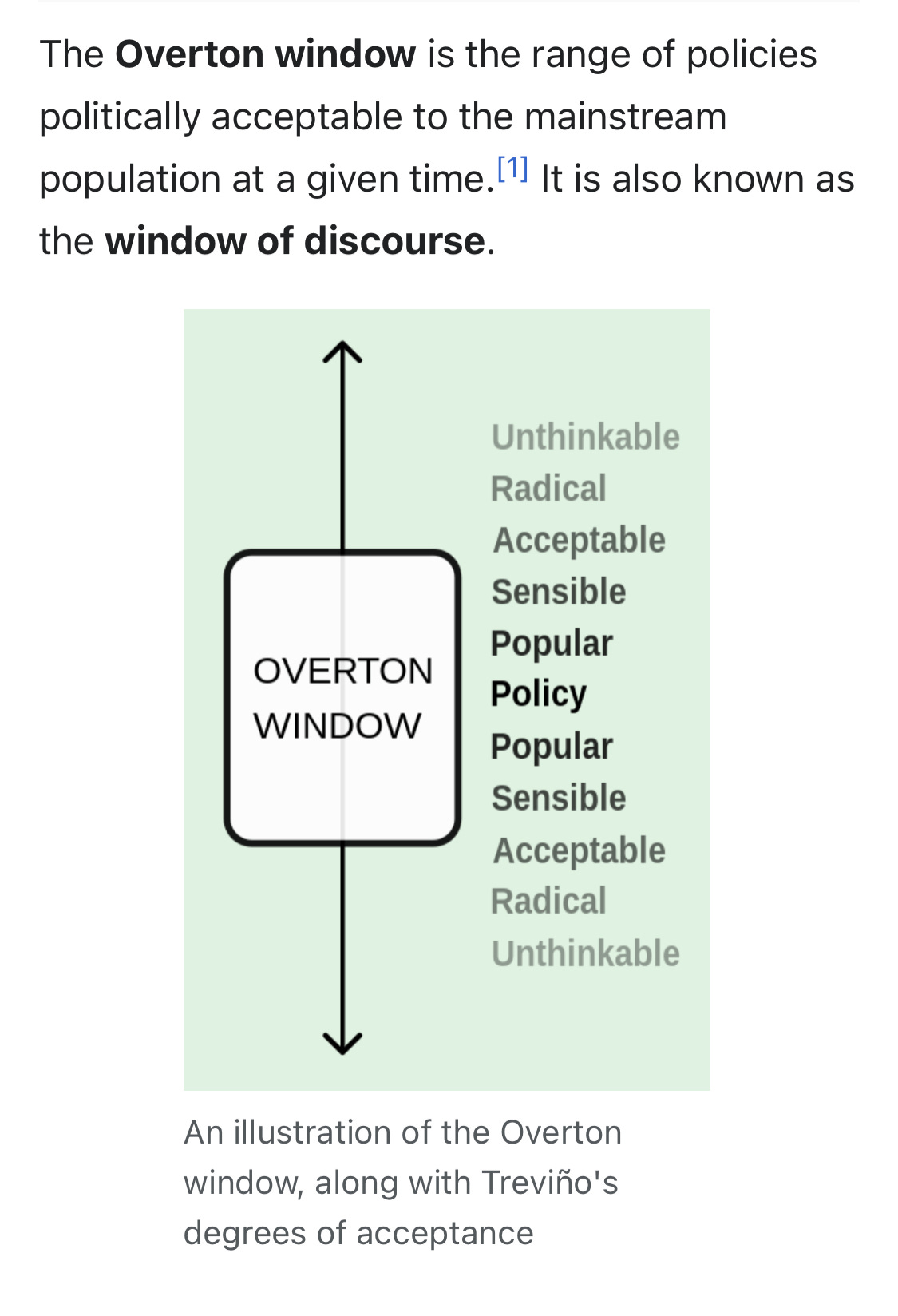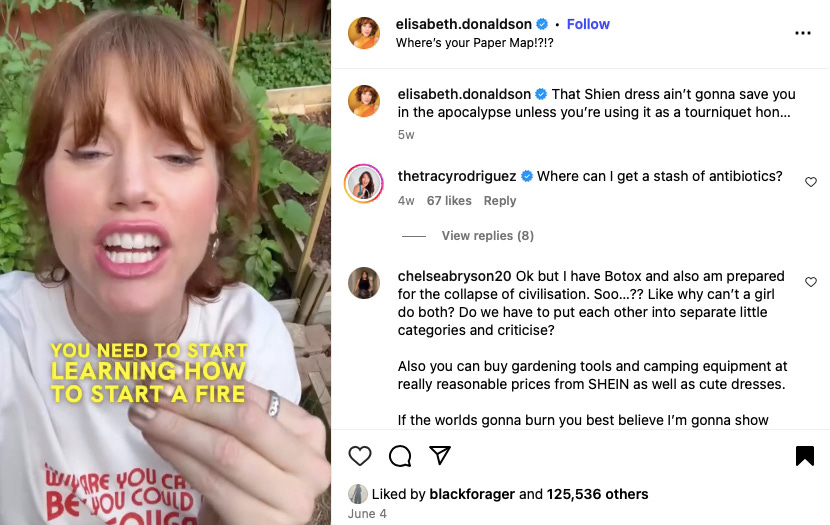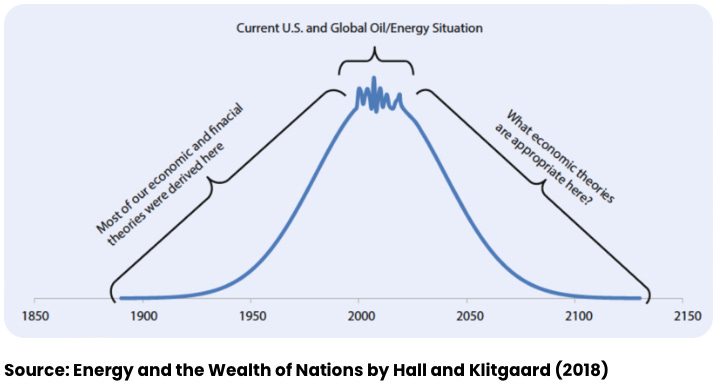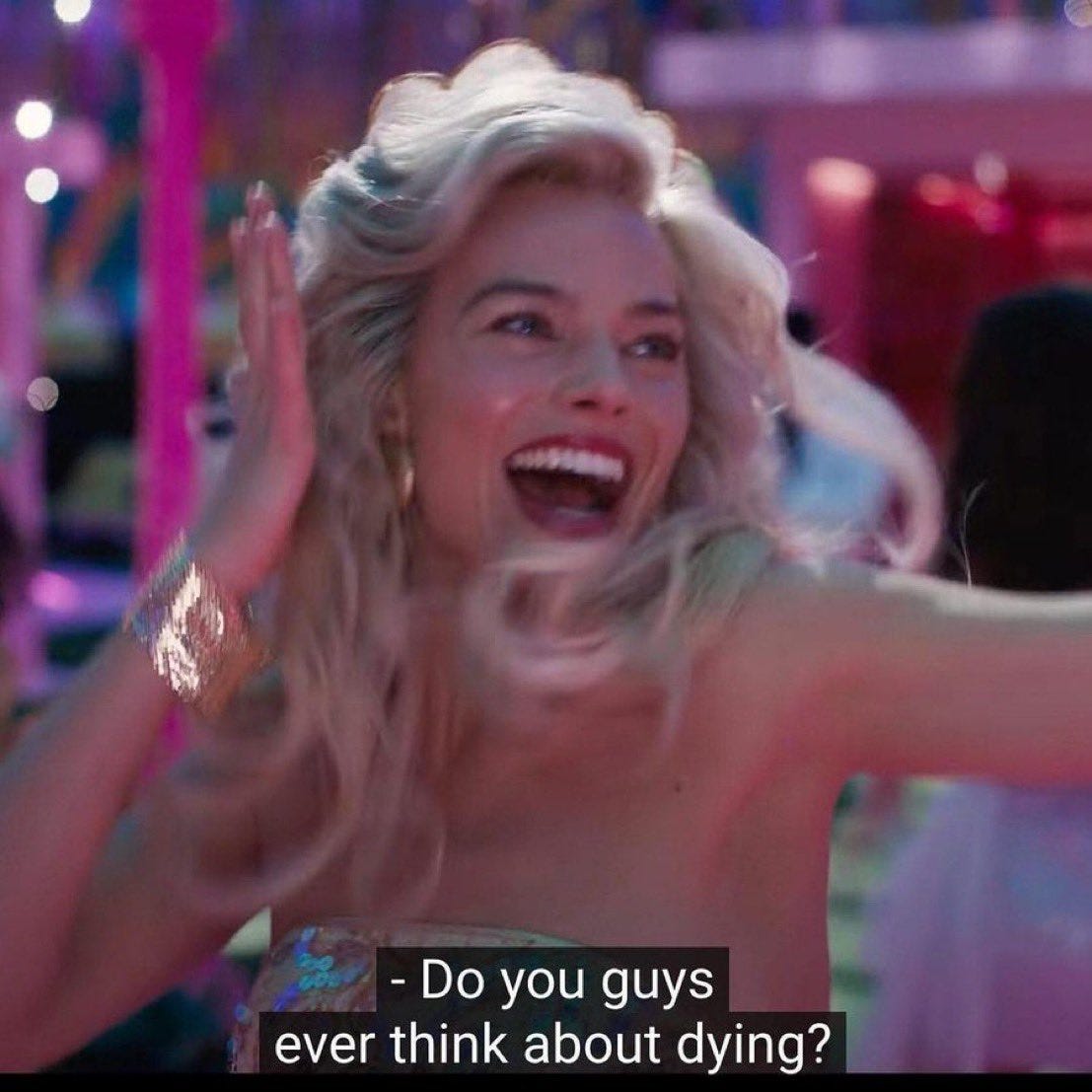Rx #4: Composting a Paradigm
"There are no sure bets for the times ahead of us; all we have are long shots. The question is which set of miracles you are willing to work for, and what kind of world those miracles would bring about." - Dougald Hine, At Work in the Ruins

What’s Currently *Within* the Window
Over time, it has become acceptable during casual social interactions to:
observe that things are bad for now (example: the Sustainable Develop Goals admit that we have much room for improvement and imply that civilization could achieve a steady developed state)
joke that the status quo will become more dystopian (example: social media posts like this one, urging women to develop more self-reliance for “the collapse of Western civilization”, or this one about being drafted for World War III)
share that you plan to behave as if the status quo is becoming more dystopian (example: announcing that you’ll be moving for climate or political reasons)


Many people already have a nagging sense of what’s underway:
In 2021, a study of 10,000 people ages 16-25 in 10 countries found that 75% think the future is frightening.
In 2024, a study of more than 15,000 Americans ages 16-25 found that
76.2% agreed that “The future is frightening”
69.4% “Climate change will influence where I choose to live”
66.0% worry about climate change threatening their health
59.5% “I question whether the work I put into my education will matter”
57.9% “I question whether the work I put into my career, job, or vocation will matter”
57.7% worry about it threatening their lives
52.3% are hesitant about having children
The number of self-identified preppers in America doubled from 10 million in 2017 to 20 million in 2024, and now includes “minorities and people considered left-of-center”.
What’s Currently *Beyond* the Window
1. Modernity’s promises were never keepable
The civilization model inherently, inevitably degrades its environment and it therefore inherently, inevitably self-destructs. What we (at the center of the empire/ superorganism) are experiencing now isn’t the consequence of someone (e.g. Exxon, Trump) destroying what could’ve been a good, lasting system; it’s the result of civilization functioning exactly in the one way it’s designed to. At present, I think the vague idea of a “renewable transition” is serving to keep the public believing in the possibility of a loophole world, where (through participation in empire and domination of all other species and human societies) we continue to enjoy lifestyles supported by functional infrastructure and long-distance supply chains - and all without incurring consequences of resource depletion and pollution.
2. Coloniality’s expiration means that the circumstances we’re going to get are not the ones that our culture’s mythology led us to plan for (and deterioration is distinct from armageddon)
What still isn’t received as “normal” is speaking and behaving in a way that reflects that systems will be malfunctioning everywhere; that collapse is therefore inescapable; and that this will force us to fundamentally change how we operate.
As I wrote in Rx #1, it’s easier to imagine the end of the world than the end of our First-World, Industrial-Era existence.
What hasn’t yet become real for us is:
It’s not just “I could lose my job (but eventually find another similar one)” but also “There won’t be anymore familiar employment with job applications, salary and benefits, weekdays versus weekends, email signatures"
It’s not just “The electricity and internet could go out” but “Electricity and internet will become history”
It’s not just “Grocery store shelves will be temporarily bare” but "Grocery stores will stop getting restocked”
It’s not just “Pandemics will threaten our health and we’ll wear face-masks” but “Modern medical care will be unavailable, such that illnesses and injuries will have more dire implications”
3. The adjustments we make to reflect the reality of collapse can consist of modest shifts and look different for everyone
At the moment, many people are living as if they don’t know what they know. It may partly be because they think the other possible paths are limited to: become a full-time homesteader (inaccessible to many) or perish in a flood/heatwave. This keeps them stuck.
"The hard part is to imagine still being here, to imagine lives worth living among the ruins of what we thought we knew, who we thought we were and where we thought the world was headed." - Dougald Hine, At Work in the Ruins
Why a Wider Window Would Not Only Be Beneficial But Should Also Be a Priority
Paradigm before Prepping
Dougald Hine explains in At Work in the Ruins:
"A lot depends on whether people feel that the promises were broken, Vanessa told me, or whether they see that these were false promises all along.
If the promises of modernity were broken, then we look for who to blame and how to take revenge.
A lot depends, then, on the recognition that those promises could never have been kept, that they were not only unrealistic but harmful.
For only with this recognition is there a chance of working out what remains, what might be done, starting from the ruins in which we find ourselves."
Without deep knowledge of coloniality as the basis for our lifestyles and as a harmful phenomenon that can’t continue, there’s a risk that any actions that we take toward resilience will be poorly thought-out and that the energy behind implementation will run low.
Benefit 1. On principle: carving out a tiny bit of space to be as open about reality-informed views as others are able to be about their fantasy-informed views
It feels silly to dissociate for the sake of keeping others comfortable and preserving their illusions of security and sustained Human Supremacy.
Benefit 2. Intra-personal: Alleviating others’ cognitive dissonance and making possible wiser choices on their part
It sucks how society invalidates our (correct) intuition and makes us feel alone in our awareness.
Nate Hagens said of his students:
“It was the recognition and the acknowledgment and the sharing of the understanding of that path with others their own age, that they actually felt more exhilarated and more positive about the future, than had it just not been explained to them.”
Similarly, when Bob Jensen told UT-Austin students in 2005 that “I think the moral challenge for you… is how to cope with living in the midst of a massive, slow-moving human die-off in other parts of the world,” one approached him later to say, “I think about that kind of thing all the time … It is nice to know I’m not crazy.”
Benefit 3. Intra-personal: Dispel unnecessary conflict
Joanna Macy, (quoted in “I Want A Better Catastrophe”) says of a time when we sought to explain her motivation for spreading predicament-awareness: “I started to say something like ‘So people can be more effective agents of social change.’ But what came right from my solar plexus was: ‘So that when things come apart, we will not turn on each other.’”
Benefit 4. Top-Down: Provide an alternative to eco-fascism
People will seek a story that is more compatible with their observations; effectively explains what they're experiencing; tells them reliably what to expect next; and provides a satisfying sense of meaning and purpose.
If it becomes more common to understand that coloniality was bound to expire, there’s a slight possibility of reasonable programs to confront our empire’s decline. At least some people might understand that any leader who promises to restore our metabolism to its previous rate is lying. Without such an understanding, there’s no possibility.
On an episode of Post-Carbon Institute’s “Crazy Town” podcast (“An Ecofascist and a Social Justice Warrior Walk into a Bar: Extremist Politics and Censorship”), the hosts wonder:
“We’ve seen a frightening rise in recent years of violence and violent rhetoric by so-called ecofascists, who use environmental and resource limits arguments to justify hateful views around immigration and population. But does that mean those of us who are concerned about ecological limits should keep our mouths shut? … Squelching discussions about limits might actually backfire and fuel ecofascist views instead”
From David Graeber (quoted in “I Want A Better Catastrophe”):
“I’m quite optimistic about the death of capitalism… I’m actually more worried that the next thing might be even worse. So… how could we have a stupider moment to tell people not to try to think of what a better system would be like?”

Benefit 5. Bottom-Up: Prompt folks to get working on what’s next
It creates the possibility that people can go from being confused about what efforts make sense to having a bit more context as guidance, and engaging in some of the activities that I describe in Rx #1, thereby creating better-than-worst conditions as described in Rx #2.
A False Conundrum
After David Pollard lists relevant skills for our future, he poses questions which I’ll reinterpret as assumptions and steps: There exist “right” people to “to do the mentoring, teaching, training, demonstrating, connecting, modelling, and other hands-on imparting of knowledge and skills”. The right strategy is to identify them, improve their competencies and empower them. Then, we ought also to get billions of people to voluntarily become capable in the listed skills. We also must make the learning easier and fun.
I don’t think those last parts will be necessary. Daniel Zetah and interviewer Nate Hagens note that, soon enough, the demand for education in new skills and practices will have grown on its own:
DZ: We're getting to a position … where we have to teach more people more things in a shorter period of time than ever in human history. And the bottleneck is going to be: Who has those skills and are there enough of them to teach the amount of people that we need to teach?
…
NH: The most likely thing is, within a decade, you are going to be incredibly busy, popular and in demand because people that have your skillset are fewer than they should be. And so, a lot of people will choose to live closer on the spectrum to what you're doing when they're forced to.
Similarly, Hine wants us to focus less on "What needs doing and how?" and more on: How did we get here in the first place? What are the nature and implications of the trouble we're in?
That’s about the contents of teaching. I had also been imaging that the education has to reach a broad portion of the public. I sensed a Catch-22 where, because folks don’t have a sense of the severity of our situation, they can’t appreciate how important it is for them to learn alternative ways of meeting basic needs, but if they were to understand it, they might become paralyzed with fear. It felt like I wasn’t able to treat grown-ups like grown-ups. It felt limiting that the popular methods of teaching/learning favor Mastery Education, and that Depth Education is not compatible with our typical formats of formalizing and scaling instruction.
The kind of teaching that is possible is the facilitation of a gradual paradigm shift. You wouldn’t try to strip every berry off of a bush, then be surprised when some refuse to break loose or taste sour. It’s going to function more like the Diffusion of Innovation, except that in this case, the innovation first occurs in our minds.
Lubricating the Window
Hine asks, “”How do you break the silence ... without becoming someone no one listens to?”
Dana Meadows relays Thomas Kuhn’s advice in her “Thinking in Systems: A Primer”:
“You keep pointing at the anomalies and failures in the old paradigm.”
“You keep speaking and acting, loudly and with assurance, from the new one.”
“You insert people with the new paradigm in places of public visibility and power.”
“You don’t waste time with reactionaries; rather, you work with active change agents and with the vast middle ground of people who are open-minded.”
But Thomas Kuhn also warned, “The competition between paradigms is not the sort of battle that can be resolved by proofs.”
“About-You” Authenticity
You could try dropping the self-censorship when someone asks *about you*. If someone remarks, “You’re so responsible about applying sunscreen”, you could explain, “I don’t think skin cancer treatment will exist when we’re older, and even though something will inevitably eventually kill me, I’m still trying to minimize the number of afflictions that I have to live with in 2050.” At least, that’s what’s true for me, so I’d be choosing honesty over dissociation for the sake of conformity and others’ comfort.
"Stop worrying as much about making sense according to the logic of the world that is ending … Be willing to stop saying things that have stopped making sense to you, merely because you feel like you ought to be saying them”
– Dougald Hine interviewed on “The Sacred”
Encouraging others to voice their intuition
In our society, so-called negativity is either completely discouraged or remains fairly superficial. Andrew Boyd realizes in “I Want a Better Catastrophe”: “You need to create ways for people to tell you how bad they already know it is.”
Discussion of collapse is most constructive when it’s in-person, un-rushed and consensual, and when the conversation follows participants’ interests and concerns. (I still struggle with sounding impatient, disrespectful and arrogant…)
Challenging misconceptions in public
If you’re in a group setting where someone implies that coloniality has a future, offer a contrasting view, only because someone who’s on-the-fence might be listening (and not because you can instantly persuade the speaker).
“The most revolutionary thing one can do is always to proclaim loudly what is happening.” — Rosa Luxemburg
An invitation to get clued-in and co-sense
Ideally, small groups of folks who are receptive to this message but at different points along the journey could connect. How do we reach those strangers? What’s an appropriate bat signal? We want to be attracting folks who: already recognize that the bad data outweigh the good and that the proposed solutions are inadequate; are seeking a cogent account of our situation that actually aligns with their observations and intuition; suspect that the future isn’t bright; and want to confront in advance what could lie ahead.

Provide Real-Life, Relatable Examples
Platform people who are making adjustments that others would perceive as reasonable. The Post-Carbon Institute’s “The Big Picture” cites Everett Rogers’ “Diffusion of Innovation” theory: “Innovators are important, but the success of their efforts depends on diffusion of the innovation among early adopters, who tend to be few in number but exceptionally influential in the general population.”
It could also be helpful to call attention to geographic areas where the technosphere and the non-manmade environment are in worse shape that we experience here, to make the prospect of transformed circumstances more real.
Make It About Companionship & Competency
It’s understandable that someone might feel discouraged about making any adjustments if they feel like they would be alone in doing it, or if it would lead to a sense of separation from their existing friends. We could seek instead to turn the project of adjustment into a source of togetherness.
On a related note, Hine says that climate change isn’t really yet forcing dramatic change in “developed” nations, and so we should instead focus on areas “where the water is higher”. We’re drowning in: loneliness, lack of meaning, mental health, screen addiction and other addictions, economic precarity and the struggle to stay fed and warm (or cool). Elsewhere, he notes that we face a scarcity of competence because we’ve outsourced much know-how and therefore agency to hyper-specialized experts.
Likewise, Jason Bradford in an interview on Planet Critical explains the upside:
“I think a lot of our mental health problems in the so-called developed world are because we deep-down know how pathetic most of us are, related to being able to provision for our basic needs in life.
And we also have a lot of social isolation. We’re not sure how good our relationships really are. We’re a mobile society. There’s a lot of shallowness. You can easily find new people, but you can also ghost them. And families have become so disconnected too. People have decided, for professional reasons they can move to the other side of the world…
There’s a hunger to be connected to things that are real and to things that are beautiful and to things that provide a sense of security, not in a sense of a bunker mentality, but in the sense that ‘I have skill sets, I have knowledge that is comforting to me and that I can share and that others can work with me to learn more and more, and it can ramp up’”
Stories & Metaphor
An episode of the Philosophize This! podcast conveys Byung Chul Han’s take on our crisis of narration:
“Instead of stories being the thing that helps us discover out identities within a larger unified whole … Being informed will be an anxious haze of articles that they can’t ever quite make sense of. Their life will be reduced to metrics and data, not ever quite sure who they are, but they’ll sell people around them whatever story they think is best for their career or love life right now. All of this with us being almost incapable of talking to each other because we have no mutual stories that bind us together.” Without story, “you don’t feel like you know what any of this is even about ... When bad times comes your way inevitably, … how do we heal … other than with a story that helps us integrate these experiences into a meaningful whole? More information, more data cannot give form to the ways in which you’re suffering”
In “My Ishmael”, Daniel Quinn’s heroine realizes that the most effective way to recruit someone to her cause is (a) through story and (b) through framing the desired behavior as a positive re-embrace of something that had been stolen.
In Feeding Each Other, Nicole Civita and Michelle Auerbach describe how subliminal stories shape our responses.
Hine has a lot to say about stories and metaphors:
He refers to Vanessa Machado de Oliveira as a "trafficker between worlds, smuggling images that might work as maps, that might help us see 'the house the European man built' as it looks to others and talk about what happens as it begins to fall."
He advises against framing messages in hard science because this makes it difficult for us to think and respond in any way except an attempt at control
“Our job is to complicate matters. Not to be difficult for the sake of it but to do justice to the strangeness and the messiness of life in a world like this, and to create the kind of space in which stories come alive... We could start with whatever seems to be getting taken for granted ... systems that tend to be invisible until they stop working” and “suggesting the possibility of other framings…”
In this conversation, he says “Your job is not to be a salesman for the apocalypse… We don't need any salesmen or evangelists for hospicing modernity, or for the ruins... For some of us, our work might include being a living question mark, like going about your life in such a way that the choices you're making, the actions you're taking, the ways in which you're showing up speak to possibilities that are not marked on the maps of the dominant culture, and which now and then awaken curiosity and lead into conversations.”
Layers
Some friends of mine are trying a “nested/layered approach”, where they broadcast a less-threatening message to attract people who are various steps in the depth learning journey, and then as understanding and trust deepen, weave in the rest.
Dougald Hine explains what it’s like to “let knowledge in”:
"Think of the moment when you get a joke. You have no information that you didn't have a moment earlier, yet you experience differently what you knew already; its significance is transformed and the effects may be at once physical, emotional and mental. The expression on your face changes, maybe you laugh out loud. This is the simplest example of what it's like when you cross the threshold of knowing. To cross this threshold is to become vulnerable: one way or another, you can be changed by what you come to know, and that change may come in the form of loss. Perhaps the loss of who you thought you were, the stories you liked to tell about yourself."

Expertise & Professionalization & Formalization
I often find myself thinking that I know more than others. Some probably determine that they know even more than I do. I think we can find a midpoint where we assert that we’re quite sure we have something true and valuable to share, while being open to it being challenged and refined.
Here are two different takes on whether or not people should be turning the coaching aspect of this into a career -
From The Evolution of Coaching:
“What if the very fabric and structure of reality itself, the eco-social, civilizational systems in which we are immersed and are obliged to enact, start to appear incoherent, irrational, unstable and delusional, and a legitimate cause of existential anxiety, perpetual outrage and threat arousal? … [People will need help to grapple with] a contraction of life expectations, autonomy, freedom and unrestrained self-actualization against the likelihood of perpetually disrupted and terrifying futures that none of us actually want to arrive in.”
“I’m reading a book about the lives of people in the most polluted, least educated, most disadvantaged, and most dangerously toxic (and most conservative) part of Louisiana… They are not particularly interested in paternalistic ‘grief professionals’ ‘coaching’ them on how to manage the massive grief and other emotions they and their families have been dealing with for generations… So I don’t see any top-down ‘professional’ answer to developing the above essential skills in the coming decades, not even the skill of ‘helping people cope’ with collapse…”
No Guarantees
Of course, much of this is easy to imagine and much more difficult to execute.
It’s possible that most people will never revise their paradigm before they die.
It’s also possible that, even if we all started now to face reality and develop the skills and practices that might enable some of us to survive coloniality’s disintegration, it might not be enough to counteract whatever chaos ensues. And we aren’t even doing that. We aren’t yet integrating what we know, so we aren’t even starting now to redirect time and energy toward taking advantage of the learning resources that are available while times are easier and the Internet is available. By the time we’re actively dealing with coloniality’s consequences and expiration, we might regret the time spent in phases of denial, avoidance and procrastination.



Great stuff! You may wish to include my free2018 e-book PDF: "Stress R Us", which elaborates the concept of "population density stress" and explores the etiology of the "stress diseases" that are killing us. Consider that we are 3,000 times more numerous today than were our ecologically balanced and self-sustaining Hunter-Gatherer/pastoralist ancestors living in their migratory clans/bands just a few thousand years ago, and surviving to this day in isolated refugia, never numbering more than 150 (Dunbar number). If we really care so much about children, then consider the collapsing world/climate the 168,000 children born today are coming into. ONLY one-child families (on ave.) can save the lives of the future survivors. Recent poll (Pew?) found that 47% of Americans 18-50 are deciding NOT to have children. Thank you for your efforts!